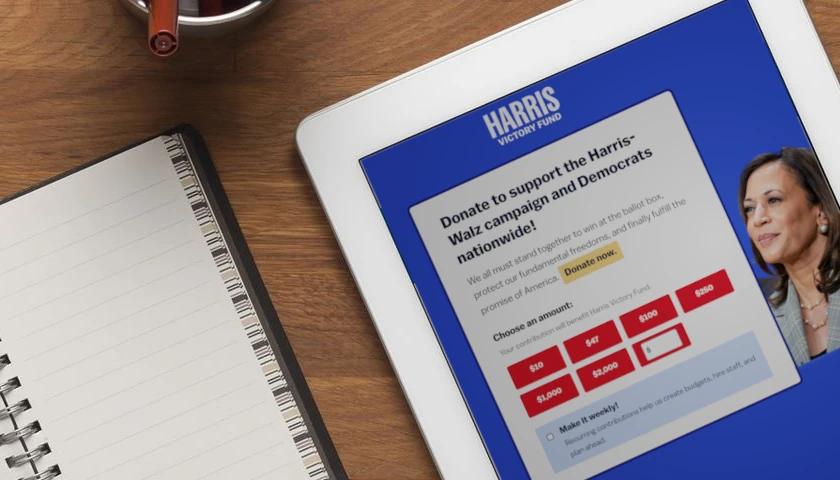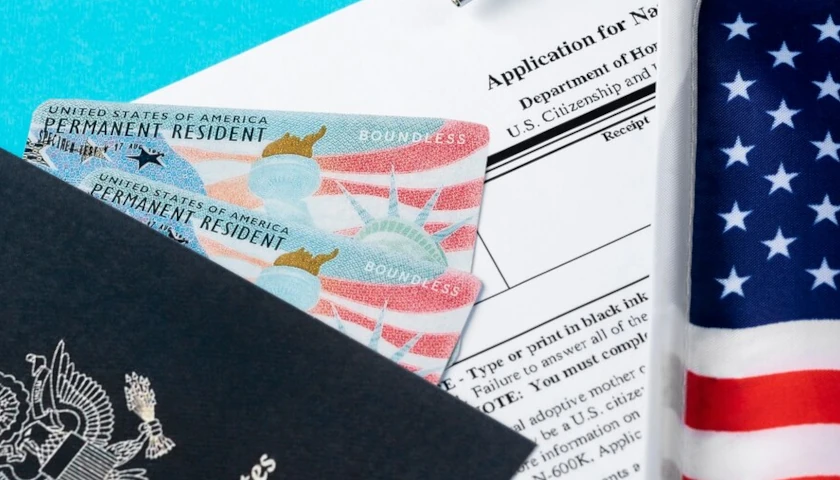by John Solomon
For the first time, a Wisconsin court has approved a subpoena to the massive Democrat fund-raising platform ActBlue, saying it owes an explanation to a Republican whose email identity was used to make liberal donations he did not authorize.
“Something is not right,” Waukesha County Circuit Court Judge Brad D. Schimel declared as he approved a limited demand for documents and opened a new front into a widening fund-raising probe begun earlier this year by Congress and 19 attorneys general.
Schimel rejected ActBlue’s arguments that it was onerous to require it to comply a subpoena for third-party donations it processed on its platform. The judge permitted GOP consultant Mark Block and his lawyers from America First Policy Institute to conduct discovery to determine if fraud was involved in the use of his identity to make dozens of Democrat donations on his old email address.
“I get the argument that this is an assumption on plaintiff’s part that the donations are fraudulent,” the judge stated in a hearing Nov. 21. “There may be an element of fraud or maybe it is innocent. Plaintiff has set forth enough in their complaint and in support of their subpoena to demonstrate that there may be something here.”
ActBlue’s lawyers unsuccessfully tried to quash the subpoena, arguing that a man using the identity Bernard Cain used Block’s email address from California and Colorado and that it is not responsible for his actions.
“ActBlue is not a party to this action,” attorney Glenn Graham argued on behalf of the fundraising platform. “They are not a defendant. The case law, and I know you read the brief, the first step to get the information from the interested person himself or herself and here that interested person is Bernard Cain. And it sounds like plaintiff is close to getting that information.”
“And we submit that should happen first before ActBlue is required to turn over anything,” Graham added.
The judge disagreed, at one point calling ActBlue, which gathers small and often recurring donations online and directs them to Democrat candidates and liberal causes, a “nonparty conduit for contributions.”
“If there is any slight by me calling ActBlue that, I don’t mean that as a slight. It just seems to me that is what it is, maybe I am wrong. But something is not right,” Schimel said. “Plaintiff has set forth enough information to explain – to be suspicious over this many small contributions being linked to an email address.”
The judge also noted that Block’s lawyers had submitted evidence from investigators of other people who are listed as giving donations to ActBlue who claim they did not make such contributions and questioned why the fundraising platform wouldn’t want to get to the bottom of the concerns.
“I don’t get why there is — why that is causing such substantial resistance to sharing it,” Schimel said of the data being sought by Block.
Civil racketeering claims
Block filed a lawsuit this fall after he discovered an old email account he used for the 2012 Herman Cain presidential campaign was receiving receipts for donations to Democrat candidates like Kamala Harris that he did not make.
The groundbreaking lawsuit in the Wisconsin state courts was made under civil racketeering laws, alleging he is a victim of identity theft in a conspiracy to abuse the massive ActBlue fundraising platform. The lawsuit named as the defendant a “John Doe” donor whose identity isn’t known but whose American Express card in California was used for all the donations.
Block’s litigation — which called the misuse of his Personally Identifiable Information (PII) “smurfing” — mirrors allegations that the House Administration Committee uncovered during a recent computer analysis that identified tens of thousands of suspicious donations placed through the ActBlue platform that appear to come from people who do not have the means to give large amounts of money.
Committee Chairman Bryan Steil referred the matter to attorneys general in five states, and that investigation has now expanded to 19 states in what is poised to become one of the larger fundraising controversies in modern American history.
“Bad actors can influence elections by laundering their ‘smurfing’ activities (i.e., making contributions via the PII of numerous donors or “smurfs”) through these anonymous bulk reports,” Block’s lawsuit filed in Waukesha County Circuit Court declared.
ActBlue steadfastly has denied wrongdoing and claims its online fundraising platform has raised $2 billion for Democrat causes since 2004. In contrast, OpenSecrets.org reported that Act Blue raised more than $3 billion in the 2024 election cycle alone.
“Democratic and progressive campaigns have trusted ActBlue’s two-decade-long track record of innovation and dependability to deliver during big fundraising moments,” ActBlue said in a statement in June celebrating its 20th anniversary in business.
Foreign money
Shortly before Election Day, House investigators formally subpoenaed ActBlue in a rapidly expanding probe into possible illicit foreign funding in the 2024 election after the Treasury Department confirmed to Congress its money laundering detection system has generated hundreds of suspicious activity reports (SARs) related to the liberal online fundraising giant.
Federal law requires financial institutions to file a suspicious activity report no later than 30 calendar days after the date of initial detection of facts that may constitute a basis for filing a suspicious activity report.
The dramatic developments were communicated to House members and ActBlue itself in a series of memos obtained by Just the News that reaffirmed that lawmakers fear foreign adversaries like China, Iran, Venezuela and Russia may be routing illicit foreign money into Democratic coffers by using the names of unsuspecting American donors.
“Although Treasury has not yet produced any records, it is currently reviewing hundreds of potentially responsive records according to three video conference calls between Committee and Treasury staff since the initial request,” House Oversight and Accountability Chairman James Comer wrote colleagues in a confidential memo in October.
Comer’s committee, House Administration Committee Chairman Bryan Steil and Sen. Ron Johnson, R-Wis., recently requested access to SARS filed by financial institutions concerning money flowing through ActBlue, and “Treasury revealed this is one of the largest records reviews it has conducted this Congress,” according to the Comer letter.
As Comer’s team awaited a review of the SARs, Steil’s committee sent a subpoena Wednesday afternoon to ActBlue demanding the massive fundraising platform turn over records on how it confirms donors’ identities and endures no fraud or money laundering occurs with contributions going to Democratic candidates and groups.
– – –
John Solomon is an award-winning investigative journalist, author and digital media entrepreneur who serves as Chief Executive Officer and Editor in Chief of Just the News. Before founding Just the News, Solomon played key reporting and executive roles at some of America’s most important journalism institutions, such as The Associated Press, The Washington Post, The Washington Times, Newsweek, The Daily Beast and The Hill.








